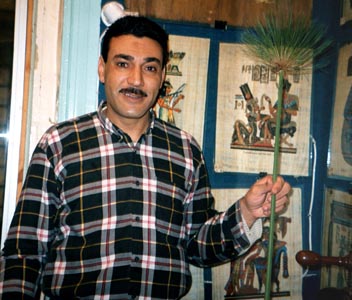
Allah
Akbar!
The Tout
The
Pyramids
The
Shower
The
Citadel
Animals
Abu
Simbel
Monuments
Indulgence
Factoids
Luxor
Security
Into Darkness
Back
to Light
Heading
Home
|
Impossibly narrow alleyways crowded with throngs of people packed in at times with little room to move or breathe....but it all flows. Mixed into the flow of people are donkey carts, horses, cars, and motorbikes. As a car passes through, several hands reach out to touch the car as if to help it pass through the crowd. Someone yells, "Qoosh!" which means, "Move" but only when you're talking about a car. People hustle around carrying things on their head. I don't see any other tourists, though I'm sure I couldn't have been the only one there. Yet another tout swoops down on me, talking fast into my ear, and we are off practically running from stall to stall, up dark alleyways, up dark stairs, down even smaller alleyways. As he moves me from stall to stall, he tells me stories of local culture and tradition. I'm sure he is getting kickbacks from the merchants which means I'm paying too much. But his stories and knowledge of getting around the vast souq make it worthwhile. I think I read somewhere that this souq might be the oldest continuing market in the world. The tout points out the maharabishi (sp?), which are screens used as windows and tells me they were used for women to talk with men. The women could only speak from behind the screen, while the man was on the ground level yelling up at her. These were the only meetings allowed before they wed. He shows me the ancient gates to the city and tells me they used to hang people there for various crimes. The last hanging was of a King, but I can't get intelligible details from him. I ask him how the food magically appears at iftar (breaking the fast, during Ramadan.) He tells me that all of the merchants and rich people contribute money which goes towards the food. Tables somehow appear on the street to feed as many as 80 people at a time. I don't understand everything he says, but I guess the food doesn't really show up by magic. ;->
I feel the oddest sense of home in the souq.....I can't explain it. But I think I might be falling in love with this city. Kayla p.s. the subject header tends to be the opening gambit from every manipulative tout on the street. Then they start calling you "sister" and trying to make you believe that they're tricking the shopkeepers into giving you better prices, because you are his "sister." Yeah, right. |
 He
takes me to another papyrus maker and I realize that I did not get
the best deals earlier in the day. But that's okay. The craftsmanship
at this latter shop was exquisite, so I bought one more small piece.
Abraham, the proprietor, made me a cup of helbaa (some sort of unidentifiable
spice) that was soothing. Then he told me the story of the judging
of the dead. I already knew some bits about this, but wanted to
hear what he had to say. I couldn't understand everything he said,
but the gist of it was that at the top of the papyrus is the solar
boat. The inhabitants that carry ankhs believe the deceased was
a good man. Those without ankhs believe he was a bad man. If the
ankh-carriers outnumber the empty-handed, the deceased will make
it to the afterlife.
He
takes me to another papyrus maker and I realize that I did not get
the best deals earlier in the day. But that's okay. The craftsmanship
at this latter shop was exquisite, so I bought one more small piece.
Abraham, the proprietor, made me a cup of helbaa (some sort of unidentifiable
spice) that was soothing. Then he told me the story of the judging
of the dead. I already knew some bits about this, but wanted to
hear what he had to say. I couldn't understand everything he said,
but the gist of it was that at the top of the papyrus is the solar
boat. The inhabitants that carry ankhs believe the deceased was
a good man. Those without ankhs believe he was a bad man. If the
ankh-carriers outnumber the empty-handed, the deceased will make
it to the afterlife.